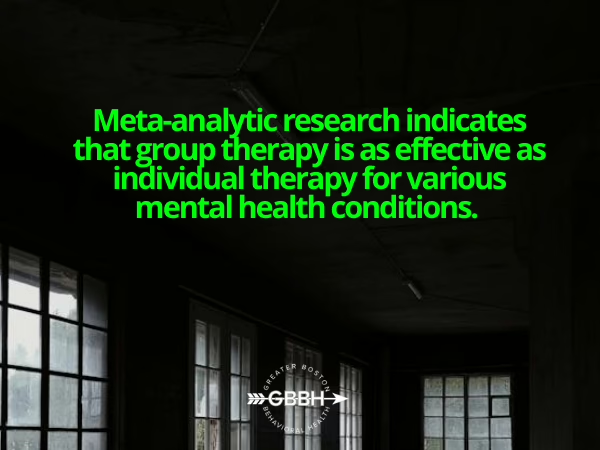Mental health treatment is most effective when it is personalized, comprehensive, and multi-dimensional. While individual therapy provides a private space for deep self-reflection, emotional processing, and goal setting, group therapy enhances healing through shared experiences, peer support, and social skill development. Combining both approaches creates a well-rounded treatment experience that helps individuals develop resilience, improve interpersonal skills, and maintain long-term emotional stability.
At Greater Boston Behavioral Health, we offer Mental Health Therapy Programs in Boston that integrate individual and group therapy to ensure a holistic, structured, and empowering treatment experience. Whether an individual is in residential treatment, an Intensive Outpatient Program (IOP), or a Partial Hospitalization Program (PHP), group therapy provides an additional layer of support that fosters recovery.
This guide explores the benefits of group therapy, how it complements individual treatment plans, and why it plays a critical role in long-term mental health recovery.
What is Group Therapy?
Group therapy is a structured form of psychotherapy where multiple participants meet under the guidance of a licensed therapist. These sessions create a collaborative space where individuals with similar struggles can discuss challenges, learn coping strategies, and support one another.
At Greater Boston Behavioral Health, our group therapy programs focus on:
- Providing emotional support through shared experiences.
- Developing healthy communication skills.
- Building emotional resilience and coping strategies.
- Offering diverse perspectives to enhance self-awareness.
Group therapy is often a key part of Inpatient Treatment Programs, Residential Treatment Programs, PHPs, and IOPs, allowing individuals to experience both personalized and collective healing.
How Does Group Therapy Complement Individual Therapy?
1. Provides a Supportive Community
Many individuals struggling with mental health challenges feel isolated or misunderstood. While individual therapy provides a private space to address these emotions, group therapy offers a supportive community where participants can relate to others who have experienced similar struggles.
How a Supportive Community Helps:
- Reduces feelings of loneliness and isolation.
- Fosters a sense of belonging and shared understanding.
- Encourages mutual encouragement and motivation.
For individuals in Residential Treatment Programs or PHPs, having a peer support network can be transformative, reinforcing the belief that they are not alone in their journey.
2. Reinforces and Strengthens Skills Learned in Individual Therapy
In individual therapy, individuals learn various coping strategies and emotional regulation techniques. However, practicing these skills in a real-world setting can be difficult without structured opportunities. Group therapy provides a safe space to apply and reinforce these skills in a supportive, therapist-led environment.
How Group Therapy Strengthens Learning:
- Encourages role-playing and real-time application of coping techniques.
- Provides live feedback on communication and problem-solving skills.
- Allows therapists to observe social interactions and offer guidance.
For example, if an individual is practicing CBT Therapy techniques in individual sessions, they can apply them in group discussions to challenge negative thought patterns with the help of peers and therapists.
3. Improves Social and Interpersonal Skills
Many mental health conditions, such as anxiety, PTSD, and depression, can negatively impact an individual’s ability to communicate effectively and build healthy relationships.
How Group Therapy Helps:
- Provides a safe environment to practice social interactions.
- Encourages honest, open communication without fear of judgment.
- Teaches assertiveness, conflict resolution, and emotional expression.
For individuals in Intensive Outpatient Programs (IOPs) or PHPs, learning how to engage in healthy interactions is crucial for successful reintegration into daily life.
4. Offers Diverse Perspectives and Shared Learning
While individual therapy is focused on self-exploration, group therapy provides exposure to different perspectives and shared experiences. Listening to others can help individuals gain insight into their own challenges and learn alternative coping strategies.
Key Benefits of Learning from Others:
- Develops empathy and a broader understanding of personal struggles.
- Introduces alternative solutions to common challenges.
- Encourages a sense of unity and collective problem-solving.
Group therapy in Behavioral Health in Boston programs helps individuals see that healing happens in many different ways, fostering hope and encouragement.
5. Promotes Accountability and Long-Term Motivation
One of the biggest benefits of group therapy is the built-in sense of accountability. Recovery is a journey, and staying motivated can be difficult without external encouragement. Group therapy fosters responsibility and consistency by:
- Encouraging goal-setting and tracking progress.
- Providing motivation from peers facing similar challenges.
- Creating a structured space where attendance and participation matter.
For individuals in Mental Health Treatment Programs in Boston, group accountability can make a significant difference in maintaining commitment to treatment goals.
Types of Group Therapy Offered at Greater Boston Behavioral Health
At Greater Boston Behavioral Health, we offer a variety of group therapy formats to complement individual treatment plans.
1. Psychoeducational Groups
These groups focus on teaching individuals about mental health conditions and coping techniques. Topics may include:
- Understanding anxiety, depression, and PTSD.
- Learning relapse prevention strategies.
- Developing stress management techniques.
2. Cognitive-Behavioral Therapy (CBT) Groups
CBT-based group therapy helps participants identify and reframe negative thought patterns while engaging in structured exercises to develop problem-solving skills.
3. Dialectical Behavior Therapy (DBT) Groups
DBT groups focus on:
- Mindfulness and distress tolerance.
- Emotional regulation techniques.
- Building healthy relationships and effective communication skills.
4. Trauma-Focused Therapy Groups
These groups are designed for individuals with PTSD or past trauma. They provide:
- A safe space to process difficult emotions.
- Tools for managing flashbacks and distressing memories.
- Education on trauma’s impact on mental and physical health.
5. Support Groups
These groups focus on peer support and shared experiences, allowing individuals to connect with others on similar recovery journeys.
The Power of Integrating Group and Individual Therapy
A successful mental health treatment plan should incorporate both individual and group therapy for a well-rounded approach to healing.
At Greater Boston Behavioral Health, we ensure that:
- Individual therapy provides deep personal exploration and private guidance.
- Group therapy enhances learning, social connections, and motivation.
- Participants have access to various levels of care, including Residential Treatment, PHPs, and IOPs.
Why Choose Greater Boston Behavioral Health?
- Experienced therapists specializing in group and individual therapy.
- Evidence-based approaches, including CBT, DBT, and trauma therapy.
- Safe, inclusive, and non-judgmental environment.
- Personalized treatment plans tailored to individual needs.
Take the Next Step Toward Healing
If you or a loved one is struggling with mental health challenges, Greater Boston Behavioral Health is here to help. Our Mental Health Therapy Programs in Boston integrate group and individual therapy to provide comprehensive, structured treatment.
Call us at (888)278-0716 to learn more about our Intensive Outpatient Program (IOP), Partial Hospitalization Program, and Residential Treatment Program. Healing is possible, and you don’t have to do it alone. Take the first step toward recovery today.
FAQ Group Therapy Complements Individual Treatment Plans
What is the difference between group therapy and individual therapy?
Individual therapy is a one-on-one session between a client and a therapist, focusing on personal struggles, emotional processing, and goal setting. Group therapy involves multiple participants working together under the guidance of a therapist, providing a supportive environment, shared experiences, and interpersonal skill-building.
How does group therapy help in mental health recovery?
Group therapy helps by:
- Providing peer support and reducing isolation.
- Reinforcing coping skills learned in individual therapy.
- Offering diverse perspectives and shared learning experiences.
- Encouraging accountability and motivation in recovery.
Can I do group therapy without individual therapy?
While some individuals benefit from group therapy alone, combining group and individual therapy provides the most effective treatment. Individual therapy allows for deep personal exploration, while group therapy enhances social skills, support, and accountability.
What types of group therapy does Greater Boston Behavioral Health offer?
We offer a range of group therapy programs, including:
- CBT Therapy Groups for cognitive restructuring.
- DBT Therapy Groups for emotional regulation.
- Trauma Therapy Groups for individuals coping with PTSD.
- Psychoeducational Groups focused on mental health education and coping strategies.
How do I know if group therapy is right for me?
If you’re looking for a supportive environment to practice coping skills, gain insights, and build social connections, group therapy may be a great fit. Our mental health professionals can help determine which program best suits your needs.
How can I start group therapy at Greater Boston Behavioral Health?
Call (888)278-0716 to speak with a professional about our Mental Health Therapy Programs in Boston, including group and individual therapy options.


